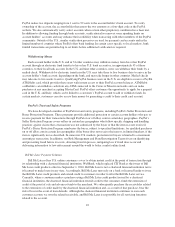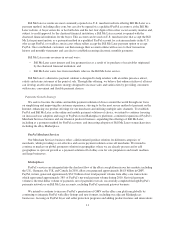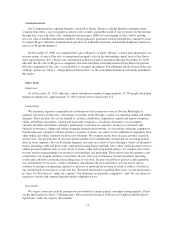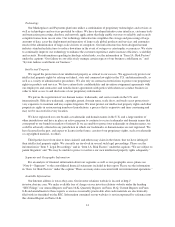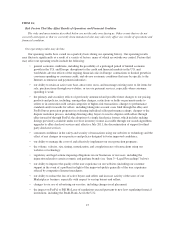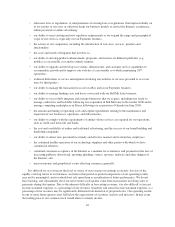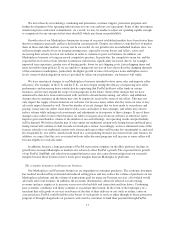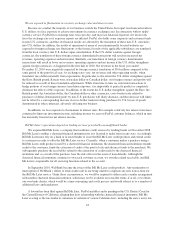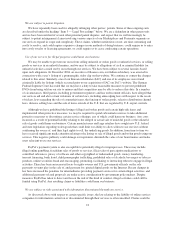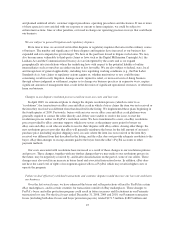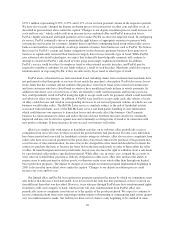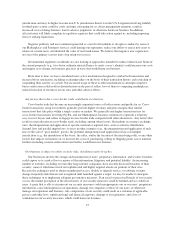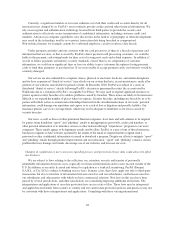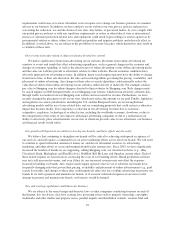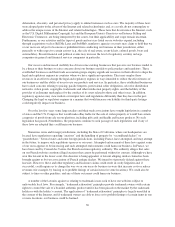eBay 2010 Annual Report Download - page 25
Download and view the complete annual report
Please find page 25 of the 2010 eBay annual report below. You can navigate through the pages in the report by either clicking on the pages listed below, or by using the keyword search tool below to find specific information within the annual report.substantial cost on PayPal. Any change to PayPal’s business practices that makes the service less attractive to
customers or prohibits its use by residents of a particular jurisdiction could decrease the velocity of trade on
eBay, which would further harm our business.
In markets other than the U.S., the EU, Australia and the China domestic business, PayPal serves its
customers through PayPal Private Ltd., a wholly-owned subsidiary of PayPal that is based in Singapore. In many
of these markets, it is not clear whether PayPal’s Singapore-based service is subject only to Singaporean law or,
if it were subject to local laws, whether such local law would require a payment processor like PayPal to be
licensed as a bank or financial institution or otherwise. In such markets, the business may rely on partnerships
with local banks to process payments and conduct foreign exchange in local currency. Local regulators who do
not have direct jurisdiction over Singapore-based PayPal Private Ltd. may use their local regulatory power to
slow or halt payments to local merchants conducted through the local banking partner. Such regulatory actions
impacting local banking partner arrangements could impose substantial costs and involve considerable delay to
the provision or development of PayPal services in that market. The Reserve Bank of India has asserted that
PayPal’s offering of payment services to customers outside of India to send personal, non-commercial payments
to recipients in India requires a license from the Reserve Bank. For a period of time in 2010, the Reserve Bank
directed the Indian affiliate of PayPal’s processing bank to suspend withdrawals to the Indian bank accounts of
PayPal customers for both personal and business customers. PayPal has suspended personal non-commercial
payments to and from Indian accounts, and has also stopped offering certain commercial payments between
Indian buyers and Indian sellers. In November 2010, the Reserve Bank of India issued guidelines to Indian banks
on the requirements for processing export-related transactions for online payment gateway service providers such
as PayPal. The Reserve Bank may again impose a suspension if it is not satisfied with PayPal’s and its partner
bank’s actions to comply with these guidelines. In the event of any non-compliance, PayPal could be subject to
fines from the Reserve Bank, and PayPal’s prospects for future business in India, both cross-border and domestic,
could be materially and adversely affected.
Even if PayPal is not currently required to be licensed in some jurisdictions, future localization or targeted
marketing of PayPal’s service in those countries, or expansion of the financial products offered by PayPal in new
jurisdictions (either alone, through a commercial alliance or through an acquisition), could subject PayPal to
additional licensure requirements, laws and regulations and increased regulatory scrutiny, any of which may
harm PayPal’s business. These factors could impose substantial costs and involve considerable delay to the
provision or development of its products. Delay or failure to receive such a license or regulatory approval could
require PayPal to change its business practices or features in ways that would adversely affect PayPal’s
international expansion plans, and could require PayPal to suspend providing products and services to customers
in one or more countries.
PayPal is also subject to various anti-money laundering and counter-terrorist financing laws and regulations
around the world that prohibit, among other things, its involvement in transferring the proceeds of criminal
activities. Although PayPal has implemented a program to comply with these laws and regulations, any errors or
failure to comply with federal, state or foreign money laundering and counter-terrorist financing laws could result
in significant criminal and civil lawsuits, penalties, and forfeiture of significant assets. In the United States,
PayPal is subject to regulations that require it to report suspicious activities involving transactions of $2,000 or
more, and may be required to obtain and keep more detailed records on the senders and recipients in certain
transfers of $3,000 or more. The interpretation of suspicious activities in this context is uncertain. Pending
regulations may require PayPal to revise the procedures it uses to verify the identity of its customers and to
monitor international transactions more closely.
Several countries in which PayPal is regulated, including Australia, Luxembourg and Singapore, have
implemented new anti-money laundering and counter-terrorist financing laws and regulations, and PayPal has
had to make changes to its procedures in response. In November 2009, the Australian anti-money laundering and
counter-terrorist financing regulator (AUSTRAC) accepted an enforceable undertaking from PayPal Australia
pursuant to which PayPal Australia agreed, among other things, to appoint an independent auditor to assess
20


